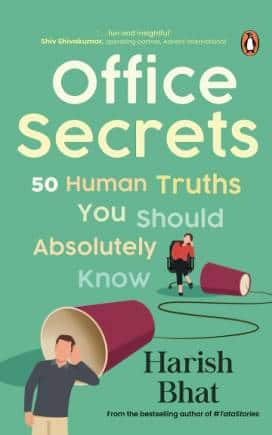



There’s no foolproof route to a happy professional life. In the average workplace, there’s usually a diverse spread of people who work alongside you — workaholics, shirkers, and everyone else occupying intermediate positions on the productivity spectrum. A good manager knows just how to handle every distinct personality type. Equally, a good employee knows how to get the best out of themselves as well as their manager/mentor. Harish Bhat, currently ‘brand custodian’ at Tata Sons, has spent over three decades in various capacities at the Tata Group. In his recent book Office Secrets: 50 Human Truths You Should Absolutely Know (Penguin Random House India), he shares the wisdom and life lessons that helped him negotiate the vagaries of a high-profile corporate job.
 Penguin Business, 256 pages, Rs 399.
Penguin Business, 256 pages, Rs 399.
This is essentially a light-hearted book that nevertheless seeks to impart meaningful advice in an accessible, easy-to-read format. These 50 chapters all began life as newspaper columns intended to be read alongside your Sunday morning cup of coffee. And so, they’re tailor-made for this exact purpose. Bhat, clearly a P.G. Wodehouse connoisseur, imbues corporate lessons with an air of levity, a sense of humour that’s cheeky but never insolent. His language is elegant without being pretentious or overbearing and his common-sense inputs can be extremely valuable for early-career professionals and veteran managers alike.
In a memorable early chapter, Bhat uses the example of the cookie platter introduced in a conference room. He does this to illustrate the various personality types present in an average corporate room—there are extremely selfish people, inexplicably selfless people and then the rest who occupy all the spaces in-between. Bhat’s description of the incurably selfish character, ‘The Grabber’, is hilarious.
“He identifies his favourite cookie and grabs it as soon as the plate is plonked on to the table. Since assorted platters are often designed to contain only one each of a type, his reactions are lightning-fast. He spares no thought for his compatriots and their possible choices, nor is he concerned about whether others will look askance. This man has absolute clarity on what he wants in life and will waste no time getting there. Indeed, his philosophy finds both his origin and destination in Ayn Rand’s belief that selfishness is the ultimate virtue.”
That last bit about Ayn Rand is a clue to Bhat’s modus operandi here. He uses broad-base, popular cultural cues to simplify his most subtle bits of advice. For example, a chapter uses passages from Shakespeare’s Hamlet to advise managers on how to trust their own instincts — “to thine own self be true” et al. At a time in the post-Internet era where anything associated with the Arts is, sadly, perceived as frivolous, Bhat’s approach is refreshing. Like the charming way in which he invokes Sherlock Holmes and Hercule Poirot to explain how and why managers should give themselves (and their trainees) space to breathe and learn and figure important things out on their own.
“As managers, we are often addicted to action — our familiar world of project meetings, email trails and action plans. But if we study the methods of Holmes and Poirot, we find that action and reflection need to happily co-exist to produce the required results. Reflection is not easy. It can be lonely and challenging. But, as Poirot will tell you, the grey cells need space and silence to work at their best.”
There are chapters where Bhat uses neologisms and freshly-whipped-up acronyms to illustrate tricky or controversial topics. One idea that I found particularly compelling was the idea of ‘reverse-mentorship’, what Bhat calls PERM, or “programme of extreme reverse mentoring”, wherein senior managers pick a young person at the beginning of their career (Bhat puts the ‘cut-off age’ at 25 years) and allot a certain time of the week to engage with them—find out their likes and dislikes, what areas they’re looking to grow in, their overall work experience at the office and so on.
“We are a relatively young country, and the youth therefore represent one of the largest consumer markets,” Bhat writes. “If you are a senior manager in a business that hopes to make inroads into the youth segment, you need to get a pulse of what they really want. Consumer research can help, but nothing can work better than a few informal PERM sessions with your mentor and his or her friends. You will learn what they value and desire, whom they respect, the language they speak and the stuff they don’t care about.”
This is sound advice and it never fails to surprise that so many ‘youth-centric’ brands and firms in this country don’t have the first clue as to what young people actually think like. It’s obvious in the smallest things, really, like their ad copy on social media. Office Secrets is full of passages like this—things that ought to be much more widely followed than they actually are in practice. This book is perfect to consume in small instalments — perhaps in between the interminable, mostly-pointless mid-week team meetings that Bhat describes here with an air of woe.
Discover the latest Business News, Sensex, and Nifty updates. Obtain Personal Finance insights, tax queries, and expert opinions on Moneycontrol or download the Moneycontrol App to stay updated!
Find the best of Al News in one place, specially curated for you every weekend.
Stay on top of the latest tech trends and biggest startup news.